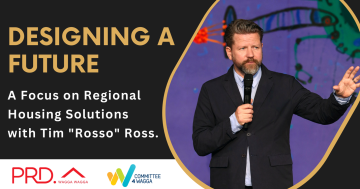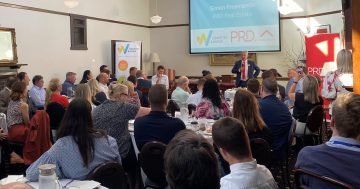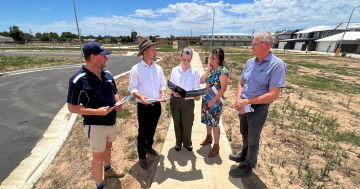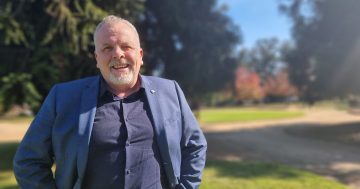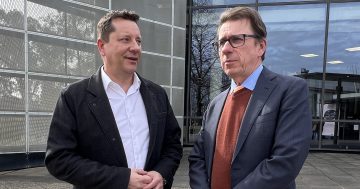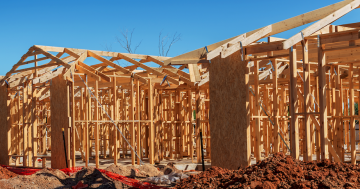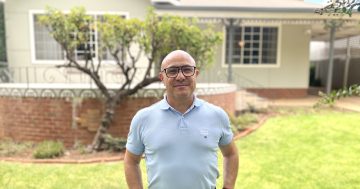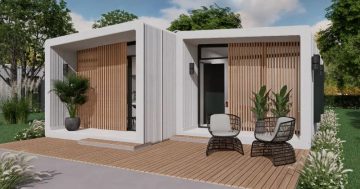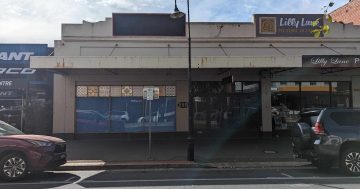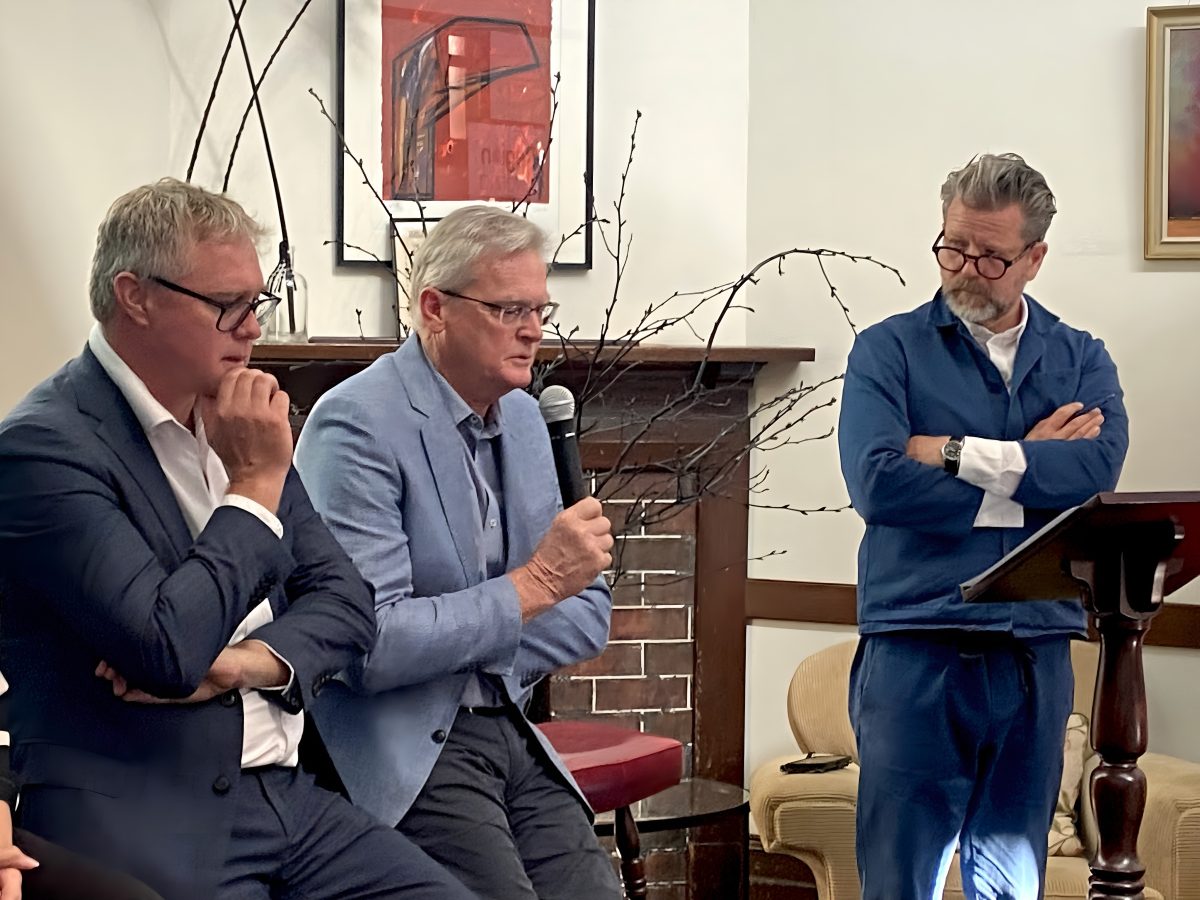
Paul Thompson, Tony Balding and Tim Ross at Wednesday’s Regional Housing Solutions forum. Photo: Chris Roe.
If there was one thing that is clear after Committee 4 Wagga’s Regional Housing Solutions forum this week, it’s that there is no easy fix to the squeeze being experienced across regional NSW at the moment.
“It’s more complex than I ever imagined,” reflected event host and media personality Tim ‘Rosso’ Ross.
“From an outsider’s point of view, it’s hard to understand how you can have an abundance of land and still not be able to make it happen.”
Local business leaders, real estate agents and property developers gathered at the Riverine Club over breakfast on Wednesday (22 November) to try and find a way forward in the face of some confronting projections.
“Honestly, I think, as a business group and the community, we’re going to need to make a lot more noise to government to make sure this message is getting through loud and clear.” local builder and former Housing Industry Association (HIA) chair Tony Balding said.
“We need to present solutions because the ministers haven’t got the time to sit down and work out what’s happening regionally when they’re dealing with thousands and thousands of properties in metro areas.”
He said sprawling bureaucracies, layers of compliance and economic pressures were slowing down production and driving up costs.
“We’re just continually getting pounded by changes,” he said.
“You pay 42 per cent taxes and levies when you’ve just bought a new house from a greenfield site to the time you turn your key in the house.”
PRD’s Chief Economist Diaswati Mardiasmo said we need to be open to exploring new and different options.
“There’s an attitude that we can’t do this because that’s not the way it’s always been done,” she said.
“We need to look at opening up things like crown land to increase the amount of available and developable land.
“We also need to change attitudes in terms of housing diversity and encouraging cultural acceptance of more apartments, for example, or living in a modular home or a 3D-printed home.
“So that also means that building codes need to be updated to make room for those more diverse housing types.”
PRD’s Simon Freemantle warned that housing development was a generational process.
“A number of developers have said you need to think long and hard about it because it takes a generation to get from start to finish to actually building the house on the ground,” he said, adding that there were only so many people who were capable of following through,” he said.
“It’s not an instant fix.”
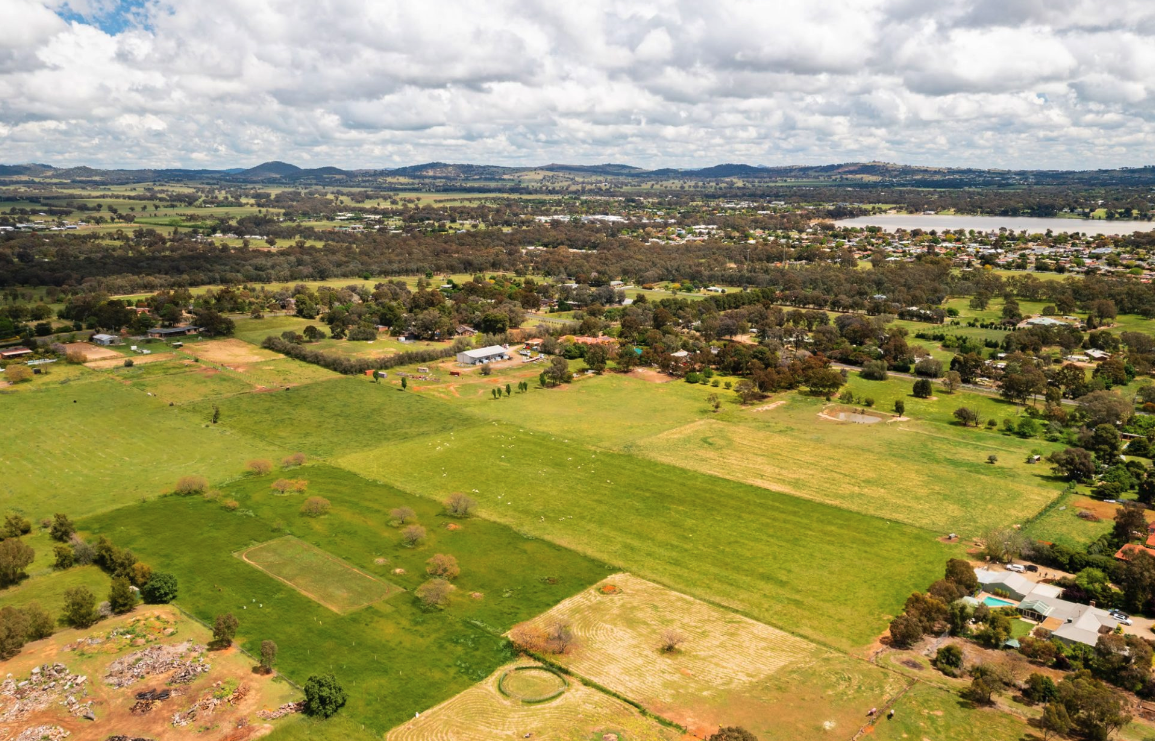
The location of the forthcoming Lake Albert Manors in Wagga’s south east. Photo: DevCore.
Council’s Director of Regional Activation John Sidgwick said that a clear growth strategy was important for local and state governments to deliver the required infrastructure.
“You can do that best by having clear growth fronts where you focus your development outcome rather than multiple different growth funds,” he said.
“It is very expensive to actually try and retrofit the services if you do that later for everyone.”
While the council’s proposed expansion of the northern growth area is still some years away, Mr Sedgwick said that private sector development in the strategic southern growth area would help bridge the shortfall.
“We’re excited about what we can bring in terms of a lot more diversity and other innovations into our planning proposal,” said Paul Thompson from DevCore, which is behind the upcoming Lake Albert Manors and Rowan Villiage.
“When you do map out everything needed for a new growth area, it can be a seven to 10-year journey to get everything ready, including infrastructure.
“We’ve used the last two and a half years to get everything ready so that hopefully next year when it’s approved we’ll have the infrastructure approvals in place and be able to deliver housing a lot earlier than what they will be doing in the northern growth area.”
In terms of revitalising existing communities and better utilising government estates, the long-promised Tolland Renewal project is often cited as a positive example.
But rather than focussing on one suburb, Tony Balding believed there are many opportunities across the region where private developers can offer solutions.
“We need to take it to the Premier’s department and say, let’s not just regenerate Tolland, but there are other streets and avenues like Kooringal and in Ashmont too,” he said.
“Let private enterprise take over. Give them an opportunity to go and do not just one or two, but three or four houses in a street.
“You can then start that assimilation in the community and get homeowners back in there with first home buyers or through rent-to-buy schemes.”
Reflecting on the current challenges at the conclusion of the forum, Tim Ross wondered whether a hands on approach might be something aspiring homeowners could consider.
“We heard lots of people talking on behalf of selling houses and building houses and developing houses and how the council has to make all that happen,” he said.
“The only answer I have is you have to take control of your own destiny, find your own block of land, or a house no one wants, grab some mates, and build something on it together.”
“Basically, you do your own community housing where you become a developer. It’s more work, but it might be a way to do it.”







